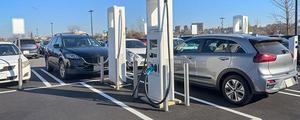This Earth Day, delve into Americans’ perceptions about the environment. Explore their views on climate change, awareness of record-breaking temperatures, how they prioritize the issue and their concerns about specific environmental problems. Gain insights on their approval of government action and their preferences in balancing economic growth and environmental protection.
Gallup tracks Americans’ views about the environment each March as part of its annual Environment poll. The latest survey was conducted March 1-20, 2024.
1. Close to Two-Thirds of Americans Are Concerned About Climate Change
Consistent with recent years, 42% of Americans worry “a great deal” about global warming or climate change. Gallup also finds 59% of Americans believing that global warming has already begun to happen. However, 55% do not think it will pose a serious threat in their own lifetime.
In terms of global warming's cause, more Americans attribute increases in the Earth’s temperature over the past century to pollution from human activities (61%) than to natural changes in the environment (33%).
2. Nearly 7 in 10 Americans Knew 2023 Was World’s Warmest Year
Last year (2023) was the hottest year on record, according to the 174-year tracking of The National Oceanic and Atmospheric Administration. Just over two-thirds of Americans (68%) have heard about the year’s record temperatures, slightly more than the 63% measured in 2016, the last time Gallup asked about the world hitting a new annual temperature high.
3. The Environment Ranks Relatively Low Among Americans’ National Concerns
Among the leading issues confronting the nation, the environment ranks as a lesser public concern, with 37% saying they worry a great deal about environmental quality. This contrasts with much higher levels of concern shown for inflation (55%), crime and violence (53%), hunger and homelessness (52%), the economy, healthcare, and federal spending, all troubling to more than half of Americans.
The environment ranks with energy, race relations and unemployment as issues evoking the least concern.
4. Pollution of Drinking Water Ranks as Americans’ Top Environmental Concern
When asked to rate their concern about several specific environmental threats, the majority of adults, 56%, say they worry “a great deal” about the pollution of drinking water in the U.S., which remains their top environmental concern among the seven problems tested in the 2024 poll. Slightly more than half also worry a great deal about the pollution of rivers, lakes, and reservoirs, and about soil and water contamination by toxic waste.
Although less than half of Americans worry a great deal about the other four issues tested -- extinction of plant and animal species, the loss of tropical rain forests, air pollution, and climate change -- most still say they worry at least “a fair amount” about each.
Climate change sparks an uncommon divide among U.S. adults, with nearly as many saying they worry only a little or not at all about the issue (38%) as say they worry a great deal about it (42%).
5. Biden Gets Highest Approval Scores on Environmental Policy
President Joe Biden, akin to other Democratic leaders, has made addressing climate change a priority of his administration. Americans give him higher marks for his handling of the environment (46%) than for other issues -- though not even on the environment does his approval rating rise to the majority level; it is likely dragged down by his low overall job approval rating.
Biden’s approval on the environment is at least four points higher than on any other issue tested in the March poll, and it is six points above his overall job approval rating.
6. Americans Tend to Believe the Government Is Doing Too Little to Protect the Environment
Currently, 50% of Americans feel the U.S. government is doing too little to protect the environment, 19% believe it’s doing too much, and 28% think it is doing the right amount.
Over three decades of measurement, the largest share of Americans has always said the government is doing too little on the issue. The percentage has exceeded 60% in five years -- all during Republican administrations, including 1992, 2006, and 2018 through 2020. The lowest readings, all below 50%, were recorded during the Barack Obama administration in 2010 and 2011 and from 2013 through 2015.
Americans’ outlook for the quality of the environment in the country varies by the party of the president. On average, the percentage of Americans who believed things were getting worse stood at 61% during the George W. Bush and Donald Trump administrations. Conversely, during the Obama years, the average was 50%. Under the Biden administration, attitudes have been less negative than under Trump and Bush but more negative than under Obama, averaging 57% getting worse.
7. Economic Recovery Shifts American Priorities Away From Environmental Concerns
Asked in Gallup trends since 1984 about the trade-offs between protecting the environment and encouraging economic growth, Americans have typically come down on the side of the environment. Currently, 52% of U.S. adults think protecting the environment should be given greater priority, even at the risk of curbing economic growth, while 38% think strengthening the economy should be given priority, even if the environment suffers to some extent.
During economically challenging periods involving sluggish economic growth or high unemployment, such as 2009 to 2013, Americans were more likely to prioritize the economy than the environment. And though Americans typically give greater weight to environmental protection, these percentages have been especially high during strong economic times, like the late 1990s.
Attitudes on this question seem especially responsive to changes in the unemployment rate -- as unemployment increases, the percentage of Americans who prioritize the economy tends to rise.
This article was compiled by Mary Claire Evans using new and existing analyses from Gallup’s March Environment surveys.




